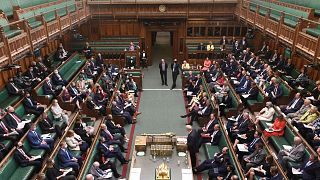Ethiopia
For Ethiopians who escaped intense fighting in their northern homeland of Tigray by fleeing into Sudan, they are now safe; but the terrifying nightmare of what they witnessed still haunts them.
"I saw bodies dismembered by the explosions," said Ganet Gazerdier, a 75-year-old sitting alone in the dust at Um Raquba refugee camp in eastern Sudan, newly opened to cope with a sudden influx of over 25,000 people fleeing air strikes, artillery barrages and massacres in Ethiopia.
"Other bodies were rotting, lying on the road, murdered with a knife", she added.
Distraught at having been forced to flee their homes, traumatised by becoming separated from family members in the mad rush, and horrified after witnessing killings, refugees wander as if dazed in the camp.
"I lived with my three daughters," said Gazerdier, dressed in a blue dress and white headscarf to protect her from the blazing sun. "When the shells started to rain down on our house, we all panicked and fled in the dark."
The bombardment not only destroyed her house in the western Tigray town of Humera, the site of reportedly some of the heaviest fighting, but also separated her from her family.
Everyone scattered, and she has yet to make contact with them.
"I met some friends who were fleeing too, and I followed them," she added. "I looked around several times in search of my daughters, but to no luck."
She has found some help at Um Raquba, 80 kilometres from the border, but conditions are spartan, with so far only basic emergency relief set up at the isolated camp.
She stops other Ethiopians to tell them her story, but no one pays attention. So many have terrible stories to tell.
"I have a daughter who lives in Khartoum but I don't know her address," she said quietly. "How can I find her in this big city?"
Ethnic divides
Ethiopian Prime Minister Abiy Ahmed announced on November 4 he had ordered military operations in Tigray in response to attacks by the regional ruling party, the Tigray People's Liberation Front (TPLF).
The conflict has turned ethnic divides deadly, said Gerdo Burhan.
If you are Tigrayan and captured by government soldiers, you are in trouble, said the 24-year-old.
"They ask you, with a gun pointed at you, if you belong to Tigrayan forces," he said. "At the slightest hesitation, you are dead. They shoot you down on the spot and leave the body in the street."
Pleading with them that you are a civilian does not make a difference, said Burhan.
"They beat you, sometimes to death, or they take you with them to an unknown destination - and I doubt if you come back alive from there," he added. "It's terror."
Burhan managed to escape to Sudan, trekking through the hot bush across the border, but he was separated from his father, mother and two sisters on the way.
"I don't know if they're okay," he said.
Faced with long columns of refugees suddenly crossing into Sudan, the government decided to reopen Um Raquba, a camp closed 20 years ago.
It once housed refugees who fled Ethiopia's 1983-85 famine that killed more than a million people. Now the basic camp is expected to house 25,000 refugees.
'Slaughtered like sheep'
For the Ethiopians who arrive, there is an initial sense of relief that they are safe.
But for many, a sense of guilt soon kicks in, as they sit and wait in the hope that those they love -- and who they were separated from in the panic - may also turn up.
To escape, Messah Geidi split from his wife and four-year-old son - and he cannot forgive himself.
"I don't know where they are, and if they are still alive," he said.
Geidi comes from the Ethiopian town of Mai-Kadra, where Amnesty International said last week that "scores, and likely hundreds, of people were stabbed or hacked to death."
"I fled Mai-Kadra, because the army slaughtered the young people like sheep," Geidi said.
The United Nations last week warned of possible war crimes in Tigray, and condemned "reports of targeted attacks against civilians based on their ethnicity or religion".












Go to video
Almost 300 killed in wave of violence in Sudan’s North Kordofan
Go to video
ICC warns of a dire humanitarian crisis in Sudan as the war rages on
01:49
Sudanese refugees in Chad face deepening humanitarian crisis
Go to video
UN warns of escalating humanitarian catastrophe in Sudan amid ongoing conflict
01:52
UN's crucial humanitarian aid work faces a clouded future amid cuts in funds
02:00
Refugees in Kenyan camp face hunger after USAID funding freeze